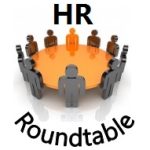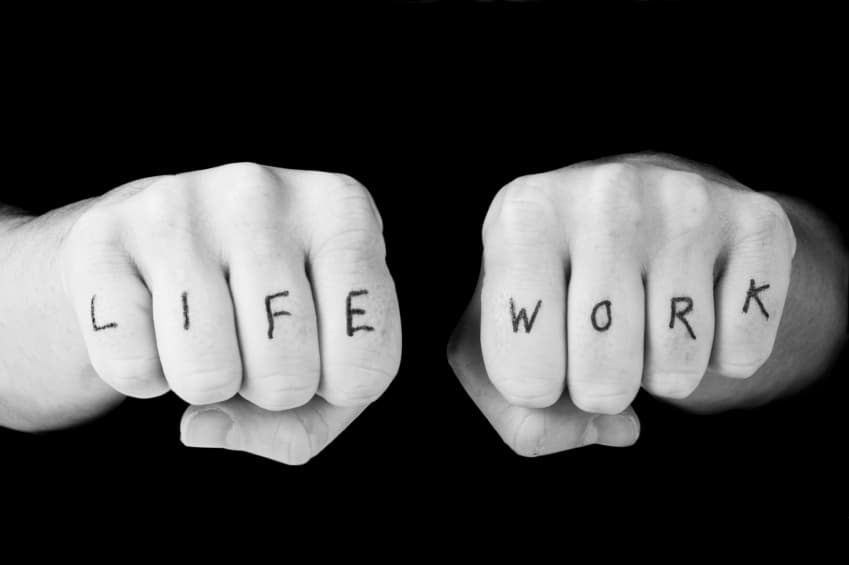The topic for the July (Cincinnati) HR Roundtable seemed to fit the time of the year because we gathered to discuss – The Myth of Work/Life Balance. Each month Steve asks people to RSVP as to whether they can attend the Roundtable or not, and it was fun to get messages that people weren’t going to make it in July because they were going on vacation to “get more balance.” It seemed that the responses meant to say balance was escaping from work.
It was a great way to get the small groups started with the following questions:
- How do you define “work”?
- Why do we think work and life are separate?
- How can we go with the flow more consistently?
The group that was present jumped right in to discuss these questions willingly. (BTW – we had another huge turnout even in July.) After a few minutes people reconvened to share their thoughts.
1. How do you define “work”?
Activity done for economic reward — This may seem very obvious, but the outcome for most people coming to work is to make money and provide for themselves and others. We can’t overlook this underlying truth when you talk about work/life issues. The economic pressures and realities of our employees is always on the minds of people.
It’s our “identity” — Don’t believe this? What’s the first question you ask another person after you greet them? 99.99% of the time it’s “So, what do you do?” – asking about a person’s occupation. It’s burned into our existence and it is how people tend to define themselves. On top of this identification, people also through on a perceived value of work that is worthwhile and jobs that are tedious. It allows people to groan and gripe about their current circumstance. This may not be all people, but it is the vast majority!
Tasks for a purpose to advance a cause — This response was a bit abstract, but it does capture the fact that people like to have stuff to do. We all want to have a visible sense of accomplishment. It gives us drive and motivation to know that we will see a result from our efforts. The hope is that those efforts also bring both personal value and value to the company where we work.
It’s where I go every day — We can’t forget that, for many, work is a location. We “go to” work. That may involve a commute, an office or multiple locations. Where we land to do the tasks we are responsible for is as much an identifying characteristic of work as is the type of tasks we toil through.
2. Why do we think work and life are separate?
It’s how we’re built and it’s what has been modeled for us — We try to compartmentalize all facets of our daily lives. In many ways, this is healthy because it gives people parameters to know when one area is getting more of our time, focus and energy. Also, for generations “life” is defined as either extracurricular activities or vacations/time away. We feel better when all of our activities fall into boxes.
We define “fun” as “not work” — The word “work” has been given a heavy meaning that is negative (more often than not). There are many people who enjoy work. In fact, they may work more than doing life things outside of their daily occupation. We think that life is doing what we’re passionate about and that leads to what we see as “fun.” We can’t effectively capture all that is fun for people because we all are unique and have varying interests.
To prevent burnout — Again, this is approaching the whole topic as an escape because people feel that work will end up being tedious at some point. That may be the case, but this assumes that burnout is a given which is sure to occur. Something to remember: If you expect burnout to happen, it will. If you look at work as tedious, it will be. This is true for all of our opinions and outlooks on the many facets of our lives.
We can’t be ourselves at work — This is not a work/life issue. It’s a company culture issue. Unfortunately, it’s true for the vast majority of those in the workforce. People tend to have a work face and a life face. Companies do their best to eliminate and depersonalize work. This is ironic because the fact that companies want people to bring their best to their job also means that they will automatically bring their humanity with them every time.
HR created work/life balance — What a fascinating answer! There may be some deep truth in this. Chances are HR folks wanted to help address the pressures they experienced themselves as well as what they’ve heard from employees. So, the topic of getting some balance in our lives may make sense so that people could enjoy both their work and their time away from it. Not sure if this is true, but it is a great observation!
Steve recommended a great book at this point of the Roundtable where you can delve into the topic even more. The book is entitled – “Bogus Balance: Your Journey to Work/Life Bliss” by Deirdre Maloney. You can find it on Amazon.
3. How can we go with the flow more consistently?
Allow for flexibility at your company — There are few industries and environments where absolutely rigid systems have to define when work occurs. Take a look at allowing flexible start and end times. Allow for part-time roles and/or job sharing to happen. Don’t make work a “one size fits all” system. It doesn’t fit our ever-changing society and our ever-changing personal and family environments.
HR can lead the way on this — If you want a way to make your company more people centric, then look at how work occurs at your company. See how you can bend, or even eliminate, systems that seem to be counter to allowing people to both thrive at work and outside of work. It’s a much more positive approach for HR to take and it gets you out of the constant dark side of life that HR has to swim in all the time.
Allow expressions of individuality — If you want people to bring their whole selves to work, then allow them to express that. Yes, you can have parameters of what’s “accepted” and what isn’t, but don’t lead with that. Let people express themselves in their workspace and allow them to bring their “life” to their work.
Remember that we’re human beings and not human doings — This was a great answer from an attendee. Take time to learn the interests of others and share your personal interests as well. You can rally and support efforts through time, volunteering or even sponsorship. See the value in the diversity of the interests of others. They long for you to ask and acknowledge all they do in both their work and their lives.
This was a fun topic to discuss. In the end, we determined that our work and our lives are forever intertwined. The key is that HR and leadership would benefit from taking interest in all facets of their employees. The more we know each other as humans, the more that our time together will be positive and productive.
